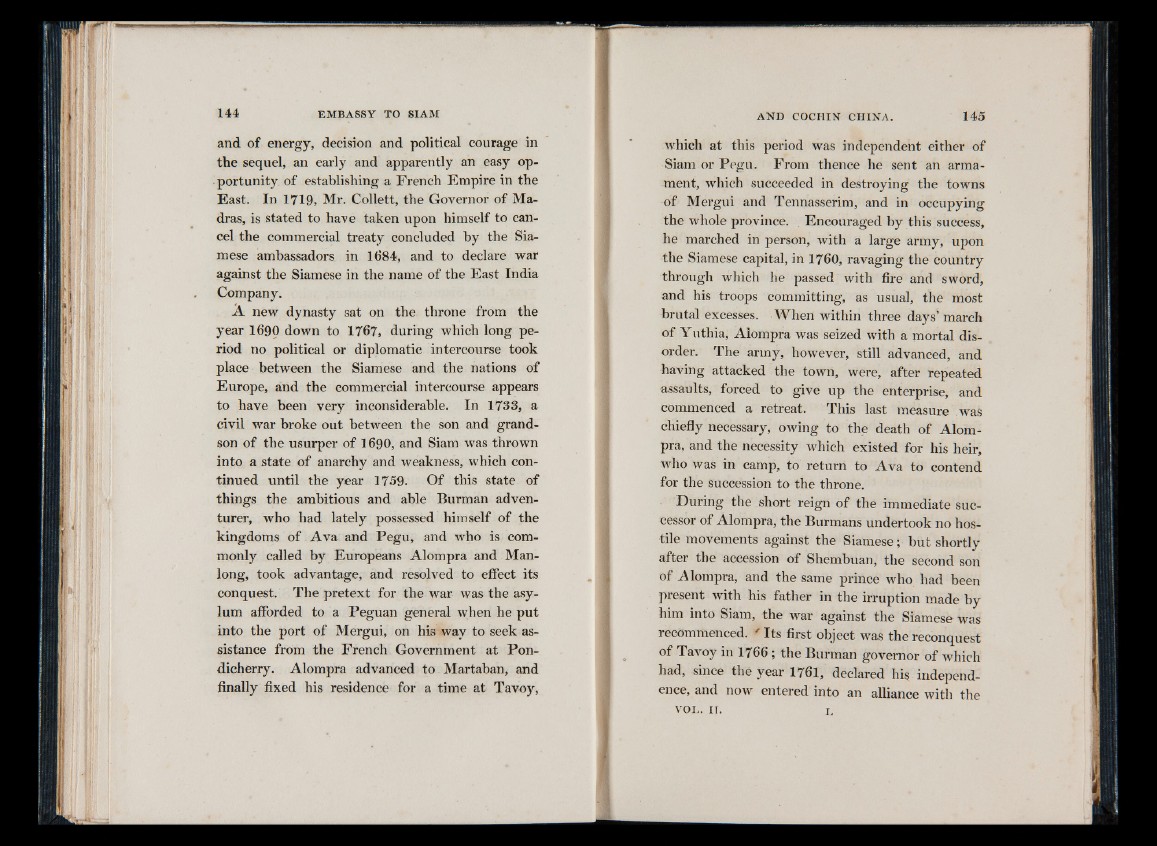
and of energy, decision and political courage in
the sequel, an early and apparently an easy opportunity
of establishing a French Empire in the
East. In 1719, Mr. Collett, the Governor of Madras,
is stated to have taken upon himself to cancel
the commercial treaty concluded by the Siamese
ambassadors in 1684, and to declare war
against the Siamese in the name of the East India
Company.
A new dynasty sat on the throne from the
year 1690 down to 1767, during which long period
no political or diplomatic intercourse took
place between the Siamese and the nations of
Europe, and the commercial intercourse appears
to have been very inconsiderable. In 1733, a
civil war broke out between the son and grandson
of the usurper of 1690, and Siam was thrown
into a state of anarchy and weakness, which continued
until the year 1759- Of this state of
things the ambitious and able Burman adventurer,
who had lately possessed himself of the
kingdoms of Ava and Pegu, and who is commonly
called by Europeans Alompra and Man-
long, took advantage, and resolved to effect its
conquest. The pretext for the war was the asylum
afforded to a Peguan general when he put
into the port of Mergui, on his way to seek assistance
from the French Government at Pondicherry.
Alompra advanced to Martaban, and
finally fixed his residence for a time at Tavoy,
which at this period was independent either of
Siam or Pegu. From thence he sent an armament,
which succeeded in destroying the towns
of Mergui and Tennasserim, and in occupying
the whole province. Encouraged by this success,
he marched in person, with a large army, upon
the Siamese capital, in 1760, ravaging the country
through which he passed with fire and sword,
and his troops committing, as usual, the most
brutal excesses. When within three days’ march
of Yuthia, Alompra was seized with a mortal disorder.
The army, however, still advanced, and
having attacked the town, were, after repeated
assaults, forced to give up the enterprise, and
commenced a retreat. This last measure was
chiefly necessary, owing to the death of Alompra,
and the necessity which existed for his heir,
who was in camp, to return to Ava to contend
for the succession to the throne.
During the short reign of the immediate successor
of Alompra, the Burmans undertook no hostile
movements against the Siamese; but shortly
after the accession of Shembuan, the second son
of Alompra, and the same prince who had been
present with his father in the irruption made by
him into Siam, the war against the Siamese- was
recommenced. Its first object was the reconquest
of Tavoy in 1766 ; the Burman governor of which
had, since the year 1761, declared his independence,
and now entered into an alliance with the
v o l . i r . L